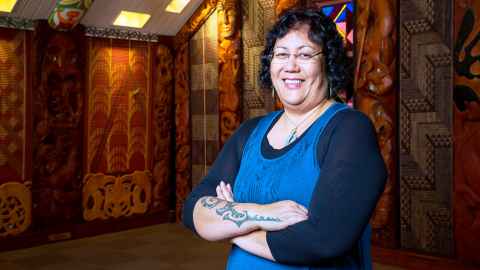Teaching Māori history must not be simply a spray tan to brown up the past
16 September 2019
Opinion: Dr Aroha Harris looks at the recent announcement that New Zealand history will be a compulsory subject in schools by 2022.

History is not simply an assemblage of facts and evidence. History is also the interrogation of those things. This may be unsettling news for some, including the naysayers who have responded to Labour’s announcement of a compulsory history curriculum by demanding to know “whose version” will be taught, or who want assurances it will be “honest and factual”.
Bah, humbug, social engineering, and all that … On it goes, people choosing sides while hoping for a unifying curriculum. There is much work to do, yet it is not clear if the government has a fine-tuned sense of what that work might entail.
We can expect the revamped curriculum to begin in 2022. We know the Ministry of Education, working with a range of interested groups and communities, will establish the 'updates' that are required for the curriculum.
A review of 'existing supports' will follow and the 'implementation package' to be developed will include teaching and learning resources. For now, the ministry will receive no additional funding for this work. So, there is that.
Recognising the value of teaching our history is long overdue and obvious, so I’m not sure the announcement needed the fanfare it received. But I appreciate why people are pleased with it, and there are definitely some who deserve credit, like the Ōtorohanga College students who led the 2015 New Zealand Wars petition, the New Zealand History Teachers’ Association who took this year’s history curriculum petition, and the teachers and schools who have been doing a good job of teaching our history. Ngā mihi ki a rātou.
As for me, I’ve been wishing that I hadn’t loaned my copy of Cherokee writer Thomas King’s The Truth About Stories to a friend just last week. Now, in the wake of this announcement, is a good time to re-read it, to be reminded of the power of the stories (and histories) we tell, about ourselves and about each other.
In good hands, history can also be incredibly liberating, revealing,
affirming.
It’s a good time to reflect on King’s idea of stories as “wondrous” and also “dangerous”, to connect with the ways that the stories, the histories we tell shape us, and shape how we understand and relate to each other.
It is a good moment to note that Māori history can be an influential and freeing "shaper” – if we let it, if we make space for it, if we don’t relegate it to a subset of New Zealand history, a spray tan to brown-up the past.
History is interpretation and meaning, and it is awareness of how we have formed and used the stories of our pasts. It has been an extraordinarily powerful colonising tool, silencing Māori histories and ridiculing Māori historical methods.
In good hands, history can also be incredibly liberating, revealing, affirming. And history imparts great skills: critical thinking, sound written communication (and these days multimedia communication), analysis and understanding of different sorts of evidence. It encourages empathy, argument and reasoning.
But, to get to that sweet productive history, it may be useful to relax about some of the thinking or expectations I have seen circulating. It may pay to be careful about expecting a curriculum that teaches a singular evolving and unifying identity and nation.
We’ve had that kind of history already, unevenly taught for sure, but one that nonetheless promotes a particular view of how we came to be the 'one' people we believe we now are. This is the history that gave us the myth of the benevolent coloniser and the bold but ultimately defeated and eventually assimilated Indigenous people.
Maybe the unity we seek in our past is not one that gives us sameness or oneness, but one that can comfortably hold differences in tension with each other. Either way, there seems to be a huge – perhaps unprecedented – opportunity in front of us, not in Labour’s announcement per se, but in the curriculum that might now be created. Time, and history, will soon tell.
Dr Aroha Harris is a senior lecturer in History, and Associate Dean Mātauranga Māori in the Faculty of Arts.
This article reflects the opinion of the author and not necessarily the views of the University of Auckland.
Used with permission from The Spinoff – Teaching Māori history must not be simply a spray tan to brown up the past – on 14 September 2019.
Media contact
Julianne Evans | Media adviser
Mob: 027 562 5868
Email: julianne.evans@auckland.ac.nz